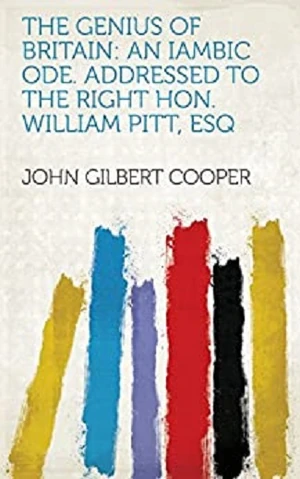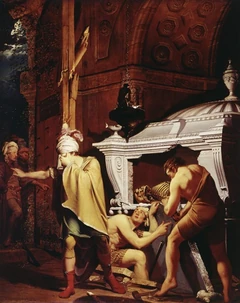No edit summary |
No edit summary |
||
| Line 64: | Line 64: | ||
:”I suppose it was upon the same conscientious Principle, that, during this charitable Delay, he busied himself in ''making new'' and revising his old Notes upon the immortal Bard of Avon;”<ref name=jgcoopersb>Sylvia Morris, "[http://theshakespeareblog.com/2013/04/john-gilbert-cooper-and-the-bard-of-avon/ John Gilbert Cooper and the Bard of Avon]," The Shakespeare Blog, April 26, 2013. WordPress, Web, Apr. 3, 2020.</ref> |
:”I suppose it was upon the same conscientious Principle, that, during this charitable Delay, he busied himself in ''making new'' and revising his old Notes upon the immortal Bard of Avon;”<ref name=jgcoopersb>Sylvia Morris, "[http://theshakespeareblog.com/2013/04/john-gilbert-cooper-and-the-bard-of-avon/ John Gilbert Cooper and the Bard of Avon]," The Shakespeare Blog, April 26, 2013. WordPress, Web, Apr. 3, 2020.</ref> |
||
| − | [[File:MiravanByJosephWright.jpg|thumb|240px| |
+ | [[File:MiravanByJosephWright.jpg|thumb|240px|Miravan Breaking Open the Tomb of his Ancestors. Painting by '''Joseph Wright of Derby''' (1734–1797), 1772. ''Courtesy [https://commons.wikimedia.org/wiki/File:MiravanByJosephWright.jpg Wikimedia Commons]''.]] |
==Recognition== |
==Recognition== |
||
Dodsley included Cooper's poetry in his 1758 anthology, ''Collection of Poems in Six Volumes; by several hands''.<ref>[https://www.eighteenthcenturypoetry.org/authors/pers00054.shtml John Gilbert Cooper], Eighteenth-Century Poetry Archive. Web, Apr. 3, 2020.</ref> |
Dodsley included Cooper's poetry in his 1758 anthology, ''Collection of Poems in Six Volumes; by several hands''.<ref>[https://www.eighteenthcenturypoetry.org/authors/pers00054.shtml John Gilbert Cooper], Eighteenth-Century Poetry Archive. Web, Apr. 3, 2020.</ref> |
||
Latest revision as of 03:55, 4 April 2020

John Gilbert Cooper, The Genius of Britain (1756). HardPress, 2018. Courtesy Amazon.com.
| John Gilbert Cooper | |
|---|---|
| Born |
24 August 1722 Lockington, Leicestershire |
| Died |
21 April 1769 (aged 46) Mayfair, London |
| Nationality | British |
| Known for | poetry |
John Gilbert Cooper (24 August 1722 - 21 April 1769) was an English poet and miscellaneous writer.
Life[]
Cooper was descended from an ancient family of Nottinghamshire, which was impoverished on account of its loyalty during the time of Charles I.[1] He was born in Leicestershire as John Gilbert, but on inheriting the land and house of John Cooper of Thurgarton Priory in Nottinghamshire his father took the additional surname of Cooper.[2]
he was educated in Sutton Coldfield,[2] and at Westminster School. In 1743 entered Trinity College, Cambridge, but quit it without taking a degree on his marriage to Miss Wright, daughter of Sir Nathan Wright, the recorder of Leicester.[1]
In 1745 he published the Power of Harmony, in 2 books, in which he promulgated that attention to what was beautiful and perfect in nature was the best means to harmonise the soul. The style is modelled on that of the author of the Characteristics [Anthony Ashley Cooper, 3rd earl of Shaftesbury], of whom he was an enthusiastic disciple.[1]
Under the name of "Philaretes" Cooper became one of the chief contributors to Dodsley's Museum, started in 1746. In 1749 he wrote a Latin epitaph on the death of his son, who expired the same day that he was born. The epitaph, a very affected piece of composition, appeared in the Gentleman's Magazine for 1778, p. 486, accompanied with a poetical English translation.[1]
In 1749 Cooper published a Life of Socrates, with an edition of his writings collected from all the ancient authorities. For this work he received notes from John Jackson, an opponent of Warburton, who took care to handle the conclusions of Warburton with some severity. Warburton replied in a note to his edition of Pope (ed. 1751, i. 151), characterizing the attack as "ignorant abuse, the offspring of ignorance." To this Cooper replied in Cursory Remarks on Warburton's edition of Pope, asserting that he attacked him as an author and not as a man.[1]
His wife died 7 weeks after giving birth to their 3rd child in 1751.[2]
In 1754 Cooper published Letters on Taste, which received a high encomium from Samuel Johnson. In 1755 he published The Tomb of Shakespeare: A vision, and in the following year, in the Genius of Britain, denounced the proposal to bring Hessian troops to defend the kingdom.[1]
In 1758 he published Epistles to the Great from Aristippus in retirement, which was soon afterwards followed by the Call of Aristippus, Epistle IV. to Mark Akenside, M.D. In 1759 he published a translation of Gresset's Vert-Vert, which was reprinted in the ‘Repository’ in 1777.[1]
In 1764 Dodsley published those of his poems which had appeared in the Museum, and in Dodsley's collections, the title being Poems on several subjects.[1]
Cooper died at Mayfair, London, in April 1769.[1]
Quotations[]
Cooper appears to be the man who coined the phrase "Bard of Avon" for William Shakespeare, in his 1751 Cursory Remarks on Warburton's edition of Pope:
- ”I suppose it was upon the same conscientious Principle, that, during this charitable Delay, he busied himself in making new and revising his old Notes upon the immortal Bard of Avon;”[2]

Miravan Breaking Open the Tomb of his Ancestors. Painting by Joseph Wright of Derby (1734–1797), 1772. Courtesy Wikimedia Commons.
Recognition[]
Dodsley included Cooper's poetry in his 1758 anthology, Collection of Poems in Six Volumes; by several hands.[3]
Cooper inspired a noted painting by Joseph Wright of Derby. The painting, entitled Miravan Breaking Open the Tomb of his Ancestors, was based on a story in Cooper's Letters of Taste.[4] Cooper had recounted a story of a greedy nobleman who despoils his ancestor's grave in search of riches to find himself cursed by his ancestor.[5]
Publications[]
Poetry[]
- The Power of Harmony: A poem, in two books. London: R. Dodsley, 1745.
- The Tomb of Shakespear. A poetical vision. London: R. & J. Dodsley, 1755.
- The Genius of Britain. An iambic ode. London: M. Cooper, 1756.
- Epistles to the great: From Aristippus in retirement. London: R. & J. Dodsley, 1757.
- The Call of Aristippus: Epistle IV: To Mark Akenside, M.D. London: R. & J. Dodsley, 1758.
- A Father's Advice to His Son: An elegy. London: R. & J. Dodsley, 1759.
- Poems on Several Subjects. London: R. & J. Dodsley, 1764.
- Poetical Works. London: 1794.
- The Poems of Cooper and Cotton (with Nathaniel Cotton). Chiswick, UK: Press of C. Whittingham, 1822.
Non-fiction[]
- Life of Socrates. London: R. Dodsley, 1749.
- Cursory Remarks on Mr. Warburton's New Edition of Mr. Pope's Works. London: M. Cooper, 1751.
- Letters Concerning Taste. London: R. & J. Dodsley, 1755.
Translated[]
- Jean Baptiste Louis Gresset, Ver-Vert; or, The nunnery parrot. London: R. & J. Dodsley, 1759.
Except where noted, bibliographical information courtesy WorldCat.[6]
References[]
Henderson, Thomas Finlay (1887) "Cooper, John Gilbert" in Stephen, Leslie Dictionary of National Biography 12 London: Smith, Elder, p. 145. Wikipedia, Web, Apr. 3, 2020.
Notes[]
- ↑ 1.0 1.1 1.2 1.3 1.4 1.5 1.6 1.7 1.8 Henderson, 145.
- ↑ 2.0 2.1 2.2 2.3 Sylvia Morris, "John Gilbert Cooper and the Bard of Avon," The Shakespeare Blog, April 26, 2013. WordPress, Web, Apr. 3, 2020.
- ↑ John Gilbert Cooper, Eighteenth-Century Poetry Archive. Web, Apr. 3, 2020.
- ↑ "Miravan Breaking Open the Tomb of his Ancestors". artfund.org.
- ↑ Letters of Taste, John Gilbert Cooper, Letter X, P.69, accessed May 2011
- ↑ Search results = au:John Gilbert Cooper, WorldCat, OCLC Online Computer Library Center Inc. Web, May 18, 2016.
External links[]
- Poems
- John Gilbert Cooper (1723-1769) info & 3 poems at English Poetry, 1579-1830
- John Gilbert Cooper at the Eighteenth-Century Poetry Archive (7 poems)
- Books
- Works by John Gilbert Cooper at Project Gutenberg
- John Gilbert Cooper at Amazon.com
- About
This article incorporates text from a publication now in the public domain, the Dictionary of National Biography (edited by Leslie Stephen). London: Smith, Elder, 1885-1900. Original article is at: Cooper, John Gilbert
|